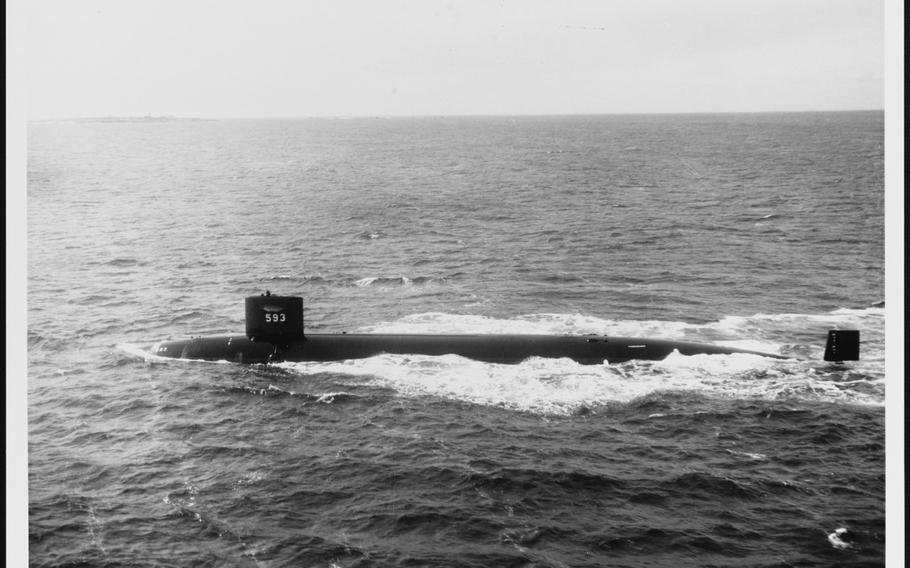
The USS Thresher seen while the submarine was underway on April 30, 1961. (J.L. Snell/U.S. Navy)
PORTLAND, Maine (Tribune News Service) — The Kittery-built submarine USS Thresher sent her final message just after 9 a.m. on April 10, 1963. The audio was garbled but it was clear she was in trouble.
Shortly thereafter, the captain of another U.S. Navy submarine, submerged nearby, heard the eerie sounds of the Thresher collapsing under ocean pressures more than 1,000 feet below the ocean off Cape Cod.
There were no survivors.
All 129 members of the crew and civilian engineers on board were lost in 8,400 feet of water.
That was 60 years ago this week. At the time, during the height of the Cold War, the loss of the nuclear-powered Thresher was an international news story, as well as an unfathomable tragedy. Countless column inches of newsprint and untold hours of television and radio broadcasts were dedicated to the tale.
The event was also enshrined in topical songs of the day. Pete Seeger, Phil Ochs, the Kingston Trio and Tom Paxton all released recordings about the Thresher. A newer contemporary tune about the Thresher was even written this century.
But marking losses at sea with melodies and rhyme is an ancient ritual, not a new phenomenon.
"Songs about maritime disasters go back as far as maritime disasters themselves," said Julia Lane, a Maine folk singer and author. "Think about Homer, Odyssius and Scylla and Charybdis."
Lane has been singing folk songs, with partner Fred Gosbee as Castlebay, for 35 years — from Maine to Florida and California to Kosovo.
Last year, the pair published their first book, "Bygone Ballads of Maine, Volume One." Inside are 163 folk songs of the sea collected by Maine folklorists. Lane and Gosbee, transcribed, researched and annotated each song. The book includes a handful of sinking ship songs.
The Kingston Trio released their Thresher ballad July 1, 1963, just three months after the tragedy.
"Oh, the Thresher, the finest atomic ship that ever dived for the sea," the song begins. "Each man on board was a volunteer, was there because he chose there to be."
"Ev'ry man jack on board was a hero. Ev'ry man jack on board there was brave
Ev'ry man jack on board was a hero. Each man risked a watery grave"
Famous folkie Pete Seeger also put out a song about the subject that year, on his album Broadside Ballads Vol. 1. Written by Gene Kadish, the song includes the lines, "The submarine called Thresher was on a deep sea dive. She dove below her safety range and crushed her crew alive."
Tom Paxton's song about the same thing took much the same tack, telling a largely matter-of-fact tale.
"She's gone, gone, gone to the bottom of the sea," it goes.
Phil Ochs and an obscure Canadian band called The Lowlanders also came out with songs in 1963.
Lane believes the Thresher songs from that time are probably not much remembered because they all stick to nuts-and-bolts storytelling, without touching any heartstrings.
"They're all too jaunty," she said.
Lane said what makes some other songs about tragedy at sea more memorable is how they talk about the palpable loss felt by those left behind who will never really know what happened to their loved ones.
She points to Gordon Lightfoot's song "The Wreck of the Edmund Fitzgerald."
An enormous hit in the 1970s, the song tells the tale of a freighter on the Great Lakes which went down with all hands in November 1975.
"That lyric, 'The church bell chimed till it rang 29 times, for each man on the Edmund Fitzgerald,'" Lane said. "You feel the bell, every stroke touching every heart that heard it that day."
But instead of the 1963 songs, Lane much prefers a 2014 song by Carolinas-based duo Shovels and Rope. Their song, "Thresher," is more poetic and much less literal.
"Oh, Thresher. We can't take no more. Slow pirouette into the arms of the ocean floor," it goes. "Mother ocean we are at the mercy of thee like children in uniform balancing on your knee."
"Mother ocean we are
At the mercy of thee
Like children in uniform
Balancing on your knee"
Lane said she appreciates the compassion in the Shovels and Rope song. The duo is slated to play a show in Portland in June.
Another reason maritime tragedy songs never go out of style, Lane said, is because they're a little like watching a scary movie. They're a safe way to experience terror.
"Except you see the horror movie in your head," Lane said, "like a ghost story around a campfire."
(c)2023 the Bangor Daily News (Bangor, Maine)
Visit the Bangor Daily News
Distributed by Tribune Content Agency, LLC.